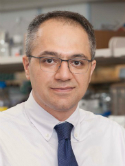Long-term breast cancer response to CDK4/6 inhibition defined by TP53-mediated geroconversion Journal Article
| Authors: | Kudo, R.; Safonov, A.; Jones, C.; Moiso, E.; Dry, J. R.; Shao, H.; Nag, S.; da Silva, E. M.; Yildirim, S. Y.; Li, Q.; O'Connell, E.; Patel, P.; Will, M.; Fushimi, A.; Benitez, M.; Bradic, M.; Fan, L.; Nakshatri, H.; Sudhan, D. R.; Denz, C. R.; Huerga Sanchez, I.; Reis-Filho, J. S.; Goel, S.; Koff, A.; Weigelt, B.; Khan, Q. J.; Razavi, P.; Chandarlapaty, S. |
| Article Title: | Long-term breast cancer response to CDK4/6 inhibition defined by TP53-mediated geroconversion |
| Abstract: | Inhibition of CDK4/6 kinases has led to improved outcomes in breast cancer. Nevertheless, only a minority of patients experience long-term disease control. Using a large, clinically annotated cohort of patients with metastatic hormone receptor-positive (HR+) breast cancer, we identify TP53 loss (27.6%) and MDM2 amplification (6.4%) to be associated with lack of long-term disease control. Human breast cancer models reveal that p53 loss does not alter CDK4/6 activity or G1 blockade but instead promotes drug-insensitive p130 phosphorylation by CDK2. The persistence of phospho-p130 prevents DREAM complex assembly, enabling cell-cycle re-entry and tumor progression. Inhibitors of CDK2 can overcome p53 loss, leading to geroconversion and manifestation of senescence phenotypes. Complete inhibition of both CDK4/6 and CDK2 kinases appears to be necessary to facilitate long-term response across genomically diverse HR+ breast cancers. © 2024 The Author(s) |
| Keywords: | controlled study; unclassified drug; human cell; somatic mutation; genetics; clinical feature; cancer growth; nonhuman; antineoplastic agent; ki 67 antigen; animal cell; mouse; animal; metabolism; animals; mice; cell cycle; progression free survival; controlled clinical trial; breast cancer; protein kinase inhibitor; animal experiment; animal model; small interfering rna; in vivo study; in vitro study; drug effect; pathology; cell line, tumor; breast neoplasms; phosphorylation; protein p53; cancer hormone therapy; protein kinase inhibitors; chromatin immunoprecipitation; transcription factor e2f; myc protein; breast tumor; tumor cell line; phosphatidylinositol 3,4,5 trisphosphate 3 phosphatase; tumor suppressor protein p53; cell cycle arrest; real time polymerase chain reaction; letrozole; senescence; drug therapy; cyclin dependent kinase; cyclin dependent kinase inhibitor; n [5 (5 tert butyl 2 oxazolylmethylthio) 2 thiazolyl]isonipecotamide; tp53 protein, human; protein p21; loss of function mutation; fluorescence activated cell sorting; cell aging; protein p130; p53; cyclin dependent kinase 4; proto-oncogene proteins c-mdm2; mdm2 protein, human; cyclin-dependent kinase 4; cyclin dependent kinase 6; cyclin dependent kinase 2; cyclin-dependent kinase 2; cyclin-dependent kinase 6; cyclin a2; clinical outcome; cdk2 protein, human; cyclin dependent kinase 2 inhibitor; cellular senescence; g1 phase cell cycle checkpoint; cdk4 protein, human; humans; human; female; article; whole genome sequencing; palbociclib; rna sequencing; hormone receptor positive breast cancer; differential gene expression; abemaciclib; ribociclib; mcf-7 cell line; hek293t cell line; single cell rna seq; mouse double minute 2 homolog; hormone receptor-positive, her2-negative breast cancer; rebemadlin; cdk6 protein, human; azd 8421; ebvaciclib; high mobility group b3 protein; tagtociclib; hcc1500 cell line |
| Journal Title: | Cancer Cell |
| Volume: | 42 |
| Issue: | 11 |
| ISSN: | 1535-6108 |
| Publisher: | Cell Press |
| Date Published: | 2024-11-11 |
| Start Page: | 1919 |
| End Page: | 1935.e9 |
| Language: | English |
| DOI: | 10.1016/j.ccell.2024.09.009 |
| PUBMED: | 39393354 |
| PROVIDER: | scopus |
| DOI/URL: | |
| Notes: | Article -- Erratum issued, see DOI: 10.1016/j.ccell.2024.10.013 -- MSK Cancer Center Support Grant (P30 CA008748) acknowledged in PDF -- MSK corresponding authors are Pedram Razavi and Sarat Chandarlapaty -- Source: Scopus |
Altmetric
Citation Impact
BMJ Impact Analytics
MSK Authors
Related MSK Work

















